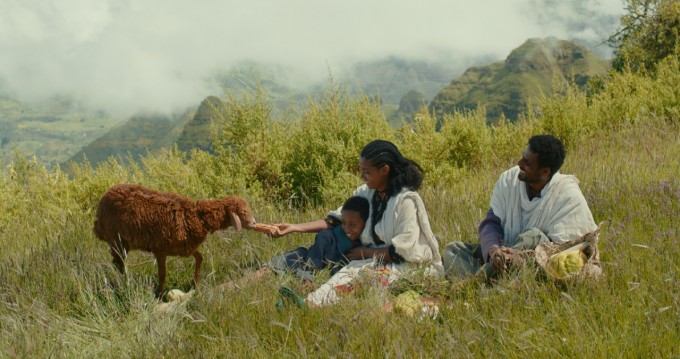
Writer|Director: Yared Zeleke
Cast: Rediat Amare, Kidist Siyum, Welela Assefa
94min Drama Ethiopia
In the verdant farmland of Bala region of Ethiopia, a lamb becomes the source of comfort for a small boy mourning the death of his mother and struggling to fit in with his new family, once his father leaves to work in Addis Ababa. Ephraim (Rediat Amare) clearly loves the animal but he realises that his family will slaughter ‘Chuni’ for the upcoming Feast of the Holy Cross and this adds a touch of melancholy to this exquisitely filmed, multilayered debut from Yared Zeleke.
Growing up himself in the urban slums of drought-ridden Ethiopia, Zeleke went on to study film in New York where he honed his craft before making this classically written ethnological film which will appeal to the arthouse crowd with its winning turn from endearing newcomer Amare and its fascinating insight into the tribal culture of Ethiopia.
The new family is not keen to take on another mouth to feed. Severe drought, like the one that took Ephraim’s mother, often blights the region and his aunt already has a poorly baby to look after. With a cousin Tsion (Kidist Siyum) who would rather read newspapers than find a husband, and his disciplinarian uncle Solomon (Surafel Teka) to contend with, Ephraim’s daily life is often miserable particularly when his cooking skills, passed on from his mother, are much stronger than his herding tactics, making him the butt of family jibes. His kindly grandmother holds sway in the household using a whip to exert her authority, so Ephraim looks for ways to join his father in Addis Ababa.
Jewish through his mother’s side of the family, Ephraim has a strong commercial sense and soon starts earning money making samosas to sell in the market, hoping to raise enough to afford the coach trip to the city, to save his pet and see his dad. Zeleke’s script cleverly balances dramatic tension that simmers below the surface as Chuni’s days are numbered forcing Ephraim to find ways to finance his escape. Tsion is an intelligent and feisty girl and Ephraim bonds with her when the pair find ways of keeping Chuni away from harm, securing him with a local Muslim shepherd girl for a few Burrs (the local currency). Thus Zeleke quietly paints a picture of religious harmony with Christians, Muslims and Jews living tolerantly together. The only strife for the Ethiopians comes from poverty and drought. Zeleke’s script mentions the lack of help from senior leaders, but this political strand is very much played down and is not central to the narrative. What makes the film especially enjoyable are Josée Deshaies’ (Saint Laurent) glorious visuals that tenderly and vibrantly depict the local customs and magnificent scenery.
Lamb could be part of the curriculum in junior schools, showing how kids in other countries manage with loneliness, isolation and trauma, even in the poorest communities. Lamb has echoes of Satyajit Ray’s classic: Pather Panchali (Pather’s Way), also about a boy who left his (Bengali) village to seek a better life in the city.
SCREENING DURING LONDON FILM FESTIVAL UNTIL 18 OCTOBER 2015